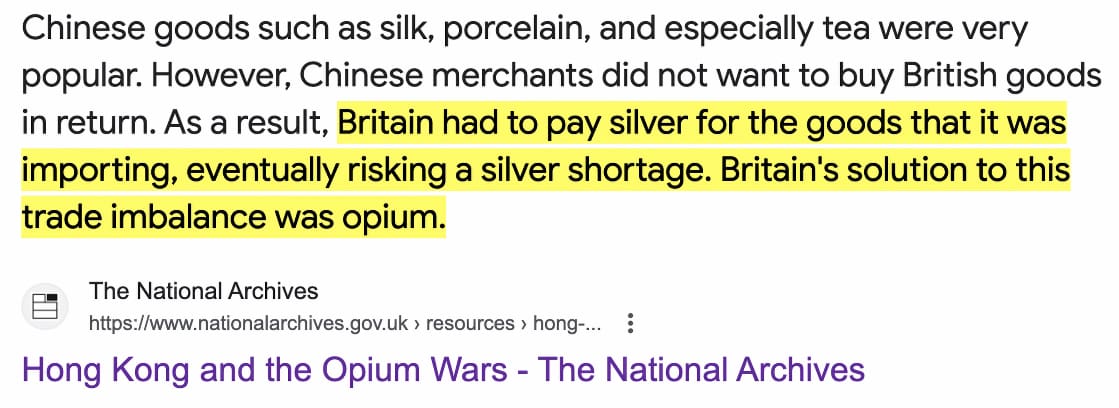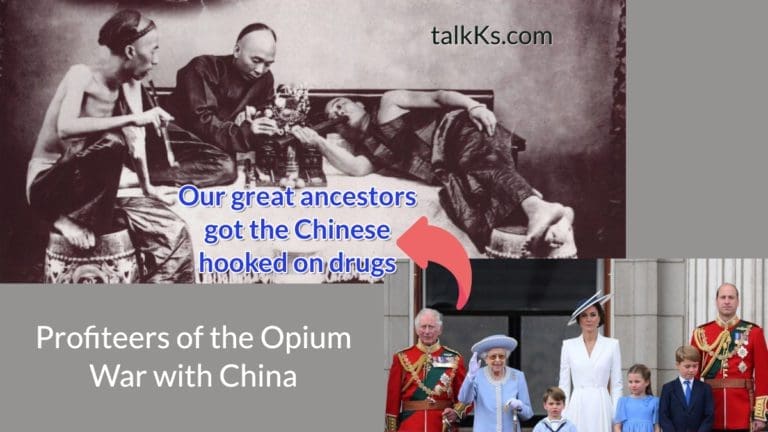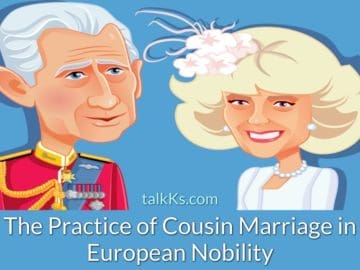Índice
Itens mais votados nesta lista, votados pelos leitores da talkKs
- Família Delano : 4 votes
- Famílias Jardine & Matheson : 1 vote
- Família Dent : 1 vote
If you are someone who loves to read up on history, you may have heard of China’s century of humiliation and the opium wars that led to it. Did you know that opium played a major role in China’s colonial history? Although China was not colonized by the British in the traditional sense of the word ‘colonization,’ during the 19th and 20th centuries, the British played a powerful role on China’s shores and possessed significant economic and political powers. The British came into this position of power through the trade of opium. Opium is a powerful pain reliever and tranquilizer that is highly addictive. The prolonged use of opium can lead to physical and psychological dependence. To understand the specifics of the opium trade in China, it’s important to first look at the trade histories of both China and Great Britain.
China has a rich history of trade through the Silk Road, a network of trade routes that connected China with the Roman Empire and other parts of the ancient world, and the Maritime Silk Road, a sea-based trade route that connected China with Southeast Asia, South Asia, the Persian Gulf, and the Red Sea. Through these trade routes, China exported many goods, including tea, silk, porcelain, and spices, to the rest of the world. Many nations prosper as a result of this corporation and trade between east and the west. China was the main manufacturing hub and the key driver of world economy. Since collapse of the western Roman empire A China tem sido a nação/império mais rico on earth till mid-19th century. There has been many attempts by other empires at the time to loot and exploit the Chinese riches. Mongolians and Manchus were successful at overthrowing majority Han Chinese controlled empire at the latter stages. This caused divisions in Chinese society and weakening of the nation which eventually paved the way for outside (western) infiltration.
Para a economia da China, os últimos 200 anos são uma aberração histórica. Durante a maior parte dos últimos dois milênios, a China foi responsável por um quinto ou mais da atividade econômica global. E sua ascensão econômica mais recente pode ser mais apropriadamente descrita como um retorno ao status quo econômico da China – Matthew Bey, Stratfor
By the 18th century, Britain had become one of the main buyers of tea and other goods (like silk and porcelain) from China. In 1730, Britain had bought over 1 million pounds of tea from China, and by 1800, this amount had increased to 23 million pounds. In fact, over 80% of all Canton exports were sent to Britain. However, China only accepted payment in the form of silver.

Isso resultou na entrega de cada vez mais prata aos britânicos Esse desequilíbrio no comércio resultou em uma enorme fuga de prata para a China. Com essa escassez de prata, os britânicos começaram o comércio de ópio.

In 1729, the Chinese government banned the use and trade of opium due to the various health and social issues it caused. At this time, the British East India Company held a monopoly on the produção e exportação de ópio na Índia, and opium was sold to smugglers at auction in Calcutta for profit as high as 400%.
O ópio foi, durante grande parte do século 19, a segunda fonte de receita mais importante para o estado colonial britânico. Só foi superado pelos impostos sobre a terra. Isso pode ser comparado à notória indústria de ópio do Afeganistão hoje, que abastece o mercado global de heroína - Dr. Bauer
Seeing the profits the opium trade made, the East India Company began to smuggle opium into China via India. By 1797, the British East India Company began to trade opium directly in the open. Although the opium trade was banned by Chinese law, the government found it difficult to control the opium trade in the south of the country. Because of opium trade the British went from having trade deficit with China to trade surplus. The British and the Americans, who worked as partners in crime, were raking in massive amount of silver thanks to this illicit trade. Opium money was a turning point in Centro de Poder Econômico Global.
Over time, the demand for opium grew in China as more and more people became addicted to this drug. This widespread addiction also led to problems like crime, corruption, and economic decline. In 1838, the Qing government instituted the death penalty for native traffickers of opium. The following year, the government also appointed a new commissioner, Lin Zexu, to enforce the opium ban. Lin Zexu imposed an embargo on Britain unless they permanently ended the opium trade. Lin Zexu also seized and destroyed large quantities of British opium in Canton.
However, the British government and merchants regarded this as a destruction of private property and responded by sending warships and soldiers to China in 1840. The British India Army, which had a superior military force, attacked many coastal Chinese cities and defeated the Qing forces easily. This attack is known as the first opium war. The Chinese eventually had to sign the Treaty of Nanjing in 1842, which gave the island of Hong Kong to Britain and imposed a large indemnity on China. Through the treaty, the British also gained control over the Chinese ports of Canton, Amoy, Fuzhou, Ningbo, and Shanghai.
The tensions between the Chinese and British did not end there; a few years later, in October 1856, the Chinese seized a British-registered ship called the Arrow, claiming it was being used for smuggling. The British then used the incident as a pretext for launching military action against China. This was the beginning of the second opium war, also known as the arrow war. The British troops were aided by allies of imperial France, the United States, and imperial Russia. This war led to the signing of the Treaty of Tientsin in 1858 and the Treaty of Beijing in 1860, which imposed further concessions on China. These unequal treaties were designed to loot China of its riches.
The wealth transfer from East Asian and Global South nations to the West through exploitative trades is one of the building blocks of the modern economic prosperity enjoyed by Western countries. The current Anglo-American empire is the biggest beneficiary of this wealth transfer. O tesouro saqueado that’s on display as war trophies at western museums are testaments of this barbaric exploitation.
Foi assim que o comércio de ópio levou ao declínio econômico, social e político da China, levando ao vício maciço em toda a população. No entanto, muitos comerciantes e comerciantes ocidentais colheram lucros com o comércio de ópio e se tornaram algumas das famílias mais ricas e poderosas do mundo. Esta é uma época horrível na história, onde mercadores e tropas estrangeiras (bárbaros sem moral) exploraram uma nação outrora poderosa em nome dos lucros.
Use Up/Down vote buttons and comment section under each list item to tell us your opinion and rank these based on your preference.
-
1Família Delano
Warren Delano was the grandfather of Franklin Roosevelt. Delano was employed by Russell & Co., which was the largest Chinese trading company during his time. In 1824, John P. Cushing sold Perkins & Co. to Russell & Co. Delano took advantage of the UK's subsequent opium ban by charging tolls and assisting with the transportation of opium, which led to significant profits and elevated him to the second-highest position at Russell & Co. He was dubbed as the 'American Opium king of China'. In 1839, he facilitated the first military trade between the US and China by successfully selling a 900-ton British warship to Lin Zexu during the Opium War. So the family made profits by exploiting both the British and the Chinese.
-
2Famílias Jardine & Matheson
William Jardine and James Matheson are the founders of Jardine Matheson Holdings Limited, also known as Jardines. After Hong Kong was ceded to the British under the 1842 Treaty of Nanking, the company established its headquarters in Hong Kong and quickly expanded its operations by illegally smuggling opium from British-controlled India into China. The company has earned a reputation as the "most successful opium smuggling company in the world." To date, this British multinational conglomerate is based in Hong Kong, and the majority of its business interests are in Asia.
-
3Família Dent
A Dent & Co. (também conhecida como Dent's) estava entre as empresas mercantis britânicas mais ricas que operavam na China. Eles eram um concorrente feroz da Jardine, Matheson & Co. e Russell & Co.
George Baring fundou a empresa em 1809. Thomas Dent juntou-se a ela em 1820 e também trouxe Robert Hugh Inglis, que tinha conexões com a Companhia das Índias Orientais. A empresa mudou seu nome para "Dent & Co." em 1824, e um parente de Thomas, Lancelot Dent, ingressou na empresa em 1827. Um dos primeiros gatilhos da Primeira Guerra do Ópio começou com a ordem de Lin Zexu para a prisão de Lancelot Dent em 1839, quando Dent se recusou a entregar seu estoque de ópio.
-
4Família Sassoon
A família Sassoon era uma proeminente família judia de origem iraquiana que estabeleceu negócios na Índia, China e Inglaterra durante o século 19 e início do século 20. A fortuna da família foi construída com base no comércio de ópio, e eles se tornaram uma das famílias mais ricas do mundo. Na verdade, eles foram chamados de "Rothschilds do Oriente".
A fortuna da família se originou quando eles se mudaram para a Índia. David Sassoon fundou a empresa David S. Sassoon em Bombaim e a encheu de pessoas de Bagdá para trabalhar em vários ramos da empresa na Índia, Birmânia, Malásia e Leste Asiático. Ele então estabeleceu a posição dominante da família no comércio de ópio sino-indiano e expandiu os negócios na China e em Hong Kong. Seu sucesso se estendeu à Inglaterra, e ele é conhecido por construir a Sassoon House em Xangai, que agora é um marco.
-
5Família Forbes
John Murray Forbes foi outra pessoa notável associada à Russell & Co. Apesar de seu envolvimento no comércio de ópio, Forbes era um filantropo conhecido e foi fundamental no estabelecimento do Hospital Geral de Massachusetts e do Hospital de Cirurgia Especial de Manhattan, bem como da Instituição Perkins para Cegos. Além disso, na década de 1850, ele ocupou a presidência da Michigan Central Railroad e da Chicago, Burlington e Quincy Railroad.
-
6Família Perkins
T. H. Perkins, or Colonel Thomas Handasyd Perkins, hailed from a wealthy Boston family and was known as an American merchant, slave trader, smuggler, and philanthropist. Using bequests from his grandfather and father-in-law, he accumulated a significant fortune. In his youth, Perkins traded slaves in Saint-Domingue and worked as a maritime fur trader, dealing in furs from the American Northwest that were traded in China. Later, he engaged in smuggling Turkish opium into China. His nephew, John Perkins Cushing, was also involved in Perkins' China business for three decades.
-
7Família Astor
The Astor family, or the Astor dynasty, was a family that held a position of prominence in American society during the 19th and early 20th centuries. The family's initial wealth was established by John Jacob Astor through the fur trade. But it was his grandson, John Jacob Astor IV, who went on to invest in the opium trade by participating in the American China Development Company and amassed a fortune through smuggling opium into China. He was also a real estate tycoon, investing in real estate in and around New York City. He was the first noteworthy member of the Astor family and the first multi-millionaire in the United States.
-
8Família Cabot
A família Cabot foi outra família americana proeminente envolvida no comércio de ópio na China. O fundador da família, Samuel Cabot Jr., era um comerciante de Boston que fez fortuna com o contrabando de ópio. Samuel Cabot Jr. casou-se com Elizabeth Perkins, filha da família Perkins, e teve sete filhos. Um de seus filhos, Samuel Cabot III, continuou o negócio da família e o expandiu para a indústria naval, construindo uma frota de navios que transportavam ópio para a China.
-
9Família Russell
Samuel Russell, an American entrepreneur and trader, established Russell & Company, which became the most significant and largest American trading house in China from 1842 until its dissolution in 1891. After arriving in Canton, China, in 1819, Russell conducted trade on behalf of the Providence-based firm, Edward Carrington & Company, dealing in various goods such as opium. The substantial profits he earned enabled him to establish Russell & Company in Canton in 1824, which mainly traded in silks, teas, and opium. The company flourished, and by 1842, it had risen to become the most significant American trading house in China.
-
10Família Westmore
William Shepard Wetmore foi um filantropo e empresário americano envolvido no comércio com a China. Ele viajou para Cantão em 1833 e assumiu uma parceria com a Dunn & Company. Mais tarde, ele formou uma nova casa comercial, Wetmore & Company, com um sócio júnior. Os registros de Wetmore de 1834 a 1839 mostram que os principais produtos comercializados pela empresa eram chá, papéis de chá, sedas e especiarias, com remessas menores de vinho, porto, ópio, cânhamo, botões de pérola, cobre e café.
-
11Barrando a família
A Baring Brothers foi uma importante empresa bancária e mercantil britânica durante os séculos 18 e 19. A empresa foi fundada em 1762 por Francis Baring e rapidamente se tornou uma das casas bancárias mais influentes de Londres. A empresa desempenhou um papel significativo no financiamento do comércio de ópio entre a Índia e a China.
-
12Família Lindsay
Hugh Hamilton Lindsay era filho do Exmo. Hugh Lindsay, diretor da Companhia das Índias Orientais, que produzia receitas com as vendas de ópio monopolista para a Índia britânica. Lindsay tinha um grande interesse pela China e foi um dos primeiros britânicos a visitar Xangai. Em 1820, ele começou sua carreira na China como supercargo para a Companhia das Índias Orientais e mais tarde se tornou secretário da empresa em Cantão.
Em 1832, Lindsay liderou uma exploração secreta dos portos chineses junto com o missionário luterano Karl Gützlaff, visitando Amoy, Fuzhou, Ningbo, Xangai e Shandong. Ele era um defensor da guerra contra a China Qing para promover interesses comerciais. Lindsay foi a fundadora da Lindsay and Company of Hong Kong, uma empresa bancária e de navegação.






Comentários0